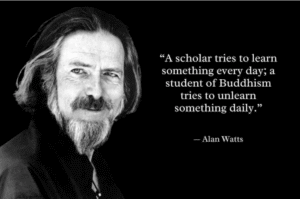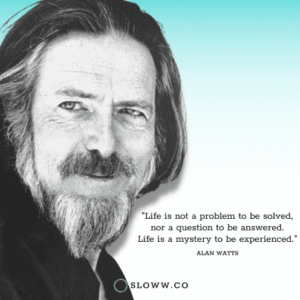Who Was Alan Watts?
Alan Watts was a prominent British philosopher, writer, and speaker who played a pivotal role in popularizing Eastern philosophy in the Western world during the mid-20th century. Born on January 6, 1915, in Chislehurst, England, Watts showed an early interest in spirituality and philosophy, influenced by his mother, who was a teacher, and his father, who worked in the British colonial service. This environment nurtured his curiosity about different cultures and belief systems.
Watts pursued his formal education at the King’s School, Canterbury, and later enrolled at the London School of Economics. It was during this time that he began to delve deeply into Zen Buddhism and other Eastern philosophies, which would profoundly shape his worldview. After moving to the United States in 1938, he became an Episcopal priest, but he soon left this role to fully embrace his passion for exploring and teaching about Eastern philosophy.
His work as an author and lecturer flourished in the 1950s and 1960s, a period marked by increasing interest in Eastern thought among Western audiences. Watts authored numerous books, including “The Way of Zen” and “The Wisdom of Insecurity,” where he skillfully articulated the essential ideas of Buddhism, Taoism, and other philosophies in an accessible manner. His charismatic speaking style and ability to distill complex concepts into relatable content made him a sought-after lecturer, attracting diverse audiences eager to explore the intersections of Eastern and Western thought.
Throughout his life, Watts emphasized the importance of mindfulness, the nature of reality, and the interconnectedness of all beings. His enduring influence can be seen in contemporary discussions surrounding spirituality, self-awareness, and consciousness. By weaving together the threads of Eastern wisdom and Western philosophy, Alan Watts has left an indelible mark on the field of philosophy, inspiring countless individuals to awaken to deeper dimensions of understanding and experience.

The Core Philosophy of Alan Watts
Alan Watts, a prominent philosopher and writer, is best known for his profound interpretations of Eastern philosophies, particularly Zen Buddhism and Taoism. Central to his philosophy is the exploration of the nature of reality, which he posits as a fluid and dynamic interplay rather than a fixed state. Watts encourages individuals to embrace the idea that reality is not an isolated entity but an interconnected web of existence, highlighting the interdependence of all things. This perspective invites deeper self-awareness and reflection, as it challenges conventional Western notions of separateness and individuality.
In discussing the interconnectedness of all things, Watts often draws parallels between the principles of Zen and the universal essence of life. He emphasizes that every element in the universe is inherently linked, advocating for a perspective that recognizes the contributions of each part to the whole. According to Watts, understanding this interconnectedness fosters compassion and gratitude, encouraging individuals to appreciate the complexity of existence and their place within it.
Moreover, mindfulness and presence are pivotal to Watts’ teachings. He asserts the importance of living in the moment, suggesting that many people are hindered by anxieties about the future or regrets about the past. By cultivating mindfulness—a state of focused awareness on the present—individuals can attain a more serene and harmonious existence. This concept resonates deeply with the practices of Zen Buddhism, where the act of meditation is not merely a routine but rather a gateway to experiencing life in its fullest capacity.
Ultimately, Watts’ philosophy serves as a call to transcend the confines of conventional thought, encouraging a more holistic understanding of oneself and the universe. As individuals engage with these ideas, they may find opportunities for profound insight and personal transformation, paving the way for a more mindful and connected way of living.

Raising Awareness Through Modern Mediums
Alan Watts, a profound philosopher and writer, has left a lasting mark on the discourse surrounding spirituality and consciousness. In contemporary society, his teachings have gained significant traction, largely due to advancements in technology and the proliferation of digital platforms. The dissemination of his ideas occurs through various mediums, allowing a diverse audience to engage with profound themes of existence, meaning, and interconnectedness.
Watts’ prolific output, which includes numerous books and recorded lectures, has become easily accessible in today’s digital age. Titles such as “The Way of Zen” and “The Book: On the Taboo Against Knowing Who You Are” resonate with modern readers, emphasizing the relevance of his philosophies. Audiobooks and eBooks have further expanded his reach, allowing individuals to absorb his insights while multitasking or during their daily commutes.
Moreover, the internet has served as a powerful tool for promoting Watts’ message. A plethora of online platforms, including YouTube and podcasts dedicated to philosophy and spirituality, regularly feature his lectures and discussions. These recordings not only entertain but also provoke deep reflection about the nature of reality and the self. The ability of social media to create communities around shared interests has furthered the outreach of his work. Online forums and discussion groups have proliferated, enabling fans and scholars to dissect his ideas collaboratively.
In addition to traditional mediums, the rise of modern communication technologies has facilitated an unprecedented exchange of views on Watts’ teachings. Consequently, his insights are no longer confined to the pages of his books; they are now part of an ongoing dialogue that encompasses various cultures and perspectives. This blend of accessibility and engagement underscores the enduring impact of Alan Watts, as his ideas continue to inspire and awaken curiosity in an increasingly interconnected world.

The Legacy of Alan Watts: Impact and Influence
Alan Watts, a prominent figure in the synthesis of Eastern philosophy and Western thought, has left an indelible mark on contemporary culture, philosophy, and spirituality. His compelling articulation of complex ideas, particularly regarding existentialism, mindfulness, and the nature of reality, continues to resonate with a diverse audience, shaping modern philosophical discourse. Watts’ ability to distill intricate Eastern concepts—such as Zen Buddhism and Taoism—into accessible language has fostered a broader understanding and appreciation for these traditions in the West.
One of the most notable aspects of Watts’ legacy is his influence on contemporary thought leaders and educators. Figures in psychology, philosophy, and lifestyle coaching often draw upon his teachings to promote holistic approaches to well-being and self-awareness. As mindfulness and meditation practices gain traction in Western societies, Watts’ insights provide a foundational context, encouraging individuals to explore these practices as pathways to greater awareness and personal growth. The rise of workshops and seminars on mindfulness often reference his work, evidencing his enduring relevance in educating individuals about the benefits of living in the present.
Moreover, Watts’ discussions on interconnectedness and the nature of self have inspired countless individuals and communities to seek deeper connections within themselves and with others. His emphasis on the importance of living authentically and embracing the fluid nature of existence resonates with those navigating the complexities of modern life. This ongoing fascination with his philosophy underscores Watts’ ability to articulate universal truths that transcend cultural boundaries, ensuring that his ideas not only persist but thrive in contemporary discourse.
In conclusion, the legacy of Alan Watts endures through his significant influence on modern thought, the promotion of mindfulness practices, and his capacity to inspire a deeper understanding of the self and existence. His teachings continue to guide individuals towards a more connected and aware life, solidifying his place as a pivotal figure in the dialogue between Eastern and Western philosophies.



